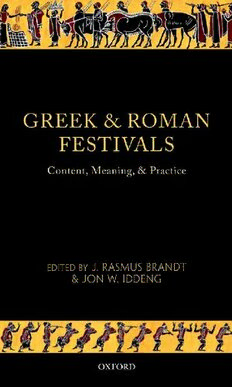Table Of ContentGREEK AND ROMAN FESTIVALS
This page intentionally left blank
Greek and Roman
Festivals
Content, Meaning, and Practice
Editedby
J. RASMUS BRANDT and JON W. IDDENG
1
3
GreatClarendonStreet,Oxford,OX26DP,
UnitedKingdom
OxfordUniversityPressisadepartmentoftheUniversityofOxford.
ItfurtherstheUniversity’sobjectiveofexcellenceinresearch,scholarship,
andeducationbypublishingworldwide.Oxfordisaregisteredtrademarkof
OxfordUniversityPressintheUKandincertainothercountries
#OxfordUniversityPress2012
Themoralrightsoftheauthorshavebeenasserted
FirstEditionpublishedin2012
Impression:1
Allrightsreserved.Nopartofthispublicationmaybereproduced,storedin
aretrievalsystem,ortransmitted,inanyformorbyanymeans,withoutthe
priorpermissioninwritingofOxfordUniversityPress,orasexpresslypermitted
bylaw,bylicenceorundertermsagreedwiththeappropriatereprographics
rightsorganization.Enquiriesconcerningreproductionoutsidethescopeofthe
aboveshouldbesenttotheRightsDepartment,OxfordUniversityPress,atthe
addressabove
Youmustnotcirculatethisworkinanyotherform
andyoumustimposethissameconditiononanyacquirer
BritishLibraryCataloguinginPublicationData
Dataavailable
LibraryofCongressCataloginginPublicationData
Dataavailable
ISBN978–0–19–969609–3
PrintedinGreatBritainby
MPGBooksGroup,BodminandKing’sLynn
Acknowledgements
The present publication collects eleven out of fourteen papers deliv-
ered at the international seminar What Is a Festival?, 19–21 May
2006,atRosendalBaronyintheHardangerfjord,southofBergen,on
the western coast of Norway. To this collection has been added a
twelfthonebyMaryBeard,areworkedversionofanarticlepublished
seventeen years ago in an anthropological book on shamanism and
mostlyunknown to classicalscholars andstudents alike (see below).
Theeditorsregretthelongproductiontimeduetoaseriesofunfore-
seencircumstancesduringtheperiodofcollectingandpreparingthe
typescripts.fortheprinter. Theediting of all typescripts,except that
ofMaryBeard,wasfinishedbyspring2010.
The seminar was born out of the preparations for a cross-disci-
plinary project Ancient Festivals, which aimed to foster and sustain
thevulnerablefieldofClassicsinNorwayinthewakeoftheBologna
reform.Though a lack of funding ultimatelyled to theproject being
putonice,itisoursincerehopethattheideasputforwardduringthe
project’s inception will one day be picked up and brought forward
again, as the subject opens up interesting collaborations between
archaeologists, historians, philologists, scholars in ancient religions,
anthropologists,andsociologists.
This cross-disciplinary collaboration also laid the foundation for
theseminarwheretheparticipantswereaskedtoreviewtheclassical
synchronic description of ancient festivals and look at the festivals’
origins, as well as their social function and meaning, from both a
synchronicandadiachronicpointofview.Itwasalsotheintentionof
the organizers to bring in scholars not only from different areas of
classical research, but also from different countries, so that various
researchtraditionscouldberepresented.Amongthefourteenspeak-
ersthefollowingcountrieswererepresented:Denmark,France,Ger-
many, Greece, the Netherlands, Norway, Sweden, Switzerland, the
UK,andtheUSA.
The seminar was made possible thanks to contributions from the
University of Oslo and the foundations Stiftelsen Thomas Fearnley,
Heddy og Nils Astrup and Sigval Bergesens d.y. og hustru Nanki’s
almennyttige stiftelse. We are extremely grateful to all financers and
vi Acknowledgements
hope that the present publication can be considered as a small, but
visible,tokenofmoneywellspent.
We should further like to present our special thanks to Professor
Emeritusinarthistory,PerJonasNordhagen,fromtheUniversityof
Bergen,whogavetheparticipantsanunforgettabletourofNorway’s
medieval capital on the day of their arrival in Bergen. Furthermore,
we are very grateful to the professional and hospitable staff of the
RosendalBarony,whodidtheirutmosttomaketheparticipantsfeel
at home. Our thanks are also extended to Stig Oppedal and Alex
Chepstow-Lusty,whodiligentlycopy-editedallthepaperswrittenby
non-native English speakers. For any mistakes which remain the
editorstaketheblame.
A special thanks goes to Mary Beard, Cambridge University. She
was originally invited to the seminar, but was not able to come due
to other commitments. However, in an attempt to improve the
balance between the Greek and the Roman contributions in this
publication, she, at short notice, accepted to rework an article pre-
viously published by N. Thomas and C. Humphrey (eds.). Shaman-
ism, History, and the State, Ann Arbor: University of Michigan
Press, 1994, 164–90. We are much indebted to both The University
of Michigan Press for letting us publish this reworked edition of the
article, and to Oxford University Press for accepting it. In the event
what we publish here is significantly different from the earlier ver-
sion,andcoversawiderrangeoftopicsthataddresstheconcernsof
this volume.
Sincere thanks go to the staff of Oxford University Press for their
professional handling of this publication from our first preliminary
request to the final product. These expressions of thanks are also
extended to OUP’s two anonymous peer-reviewers, who both made
veryvaluablesuggestionstoimprovethequalityofthepublication.In
particularweshouldliketothankMsHilaryO’Shea,who,amongthe
many editors we requested, was the one to answer and support this
project at an early stage when it was only a castle in the air without
anyfinancialfoundation.
Last,butnotleast,weshouldliketothankalltheparticipants,who
allcontributedinmakingtheseminarasuccessfulevent,inparticular
to those who had the time and energy to rewrite their papers into
what makes up this book. We were very touched by their many
expressions of thanks afterwards. One participant even returned
home and boasted that he had been to Paradise, and in one way he
Acknowledgements vii
was closer to the truth than he could have imagined; on leaving
Bergen, heading south towards Rosendal, we actually drove through
avillagecalledParadis.
J.RasmusBrandtandJonW.Iddeng
Oslo,June2011
This page intentionally left blank
Contents
Abbreviations xi
ListofFigures xii
NotesonContributors xv
Introduction 1
SomeConceptsofAncientFestivals
J.RasmusBrandtandJonW.Iddeng
1. WhatisaGraeco-RomanFestival? 11
APolytheticApproach
JonW.Iddeng
2. AncientViewsonFestivals 39
ACaseofNearEasternMediterraneanKoine
WalterBurkert
3. GreekFestivalsandtheRitualProcess 53
AnInquiryintotheOlympia-cum-Heraia
andtheGreatDionysia
SynnøvedesBouvrie
4. PelopsJoinstheParty 95
TransformationsofaHeroCultwithinthe
FestivalatOlympia
GunnelEkroth
5. ContentandForm 139
SomeConsiderationsonGreekFestivalsandArchaeology
J.RasmusBrandt
6. ThePoliticalProcessinthePublicFestival 199
ThePanathenaicFestivalofAthens
JeniferNeils
7. TalkingofFestivals 217
TheStatusofChorusesandChoregia
ScottScullion

